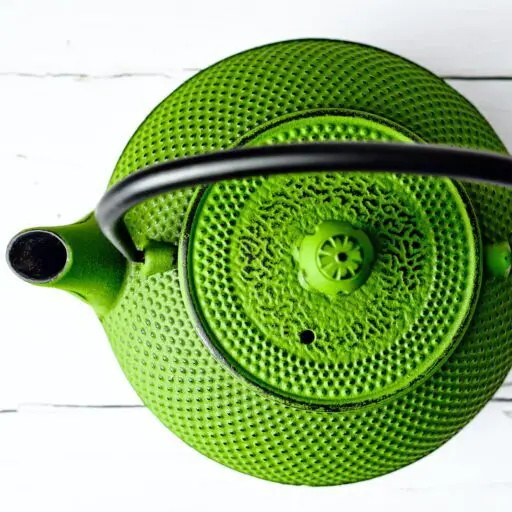Support our educational content for free when you purchase through links on our site. Learn more
Which Tea Has the Most Benefits? [2024]

Open your mind and sip your tea, that’s the only way to truly enjoy it. – James Norwood Pratt
Tea, the beloved beverage that has been enjoyed for centuries, offers not only a comforting and soothing experience but also a plethora of health benefits. But with so many different types of tea available, which one should you choose to maximize the benefits? In this article, we will explore the world of tea and answer the burning question: Which tea has the most benefits? So grab your favorite cuppa and let’s dive in!
Table of Contents
- Quick Answer
- Quick Tips and Facts
- Background: The History of Tea
- The Healthiest True Teas
- The Healthiest Herbal Teas
- Drink to Your Health
- FAQ
- Conclusion
- Recommended Links
- Reference Links
Quick Answer
When it comes to tea, the health benefits are abundant across various types. However, if we had to choose one tea that stands out for its numerous benefits, it would be green tea. Green tea is packed with antioxidants, such as catechins, which have been linked to a wide range of health benefits, including improved brain function, weight loss, and reduced risk of chronic diseases like cancer and heart disease. So, if you’re looking for a tea that offers the most benefits, green tea is the way to go.
CHECK PRICE on: Amazon | Walmart | Etsy
Quick Tips and Facts
Before we dive deeper into the world of tea benefits, here are some quick tips and interesting facts to keep in mind:
- All true teas (green, black, white, oolong) come from the same plant, Camellia sinensis. The differences in flavor and health benefits arise from variations in processing methods.
- Herbal teas, also known as tisanes, are not made from the Camellia sinensis plant but are infused with various herbs, flowers, fruits, and spices.
- To reap the maximum benefits from tea, opt for loose leaf tea instead of tea bags. Loose leaf tea generally contains higher-quality leaves and allows for better flavor extraction.
- The temperature and steeping time can affect the taste and health benefits of tea. Follow the recommended brewing instructions for each type of tea to achieve the best results.
Now that we have the basics covered, let’s explore the health benefits of different types of tea in more detail.
Background: The History of Tea

Before we delve into the health benefits of tea, let’s take a moment to appreciate the rich history and cultural significance of this beloved beverage. Tea originated in ancient China and has been enjoyed for over 5,000 years. It was initially consumed for its medicinal properties before evolving into a popular social and cultural drink.
Tea made its way to different parts of the world through trade routes, and each region developed its own unique tea traditions. From the traditional tea ceremonies of Japan to the comforting cups of black tea in England, tea has become an integral part of many cultures.
Now, let’s explore the health benefits of tea in more detail, starting with the true teas.
The Healthiest True Teas
True teas, including green, black, white, and oolong teas, all come from the same plant, Camellia sinensis. However, their processing methods and levels of oxidation vary, resulting in distinct flavors and health benefits. Let’s take a closer look at each of these teas and their unique properties.
1. Green Tea
Green tea is often hailed as the healthiest tea due to its high concentration of antioxidants. It undergoes minimal oxidation during processing, preserving its natural compounds. Here are some of the key health benefits of green tea:
- Boosts brain function: Green tea contains caffeine and an amino acid called L-theanine, which work together to improve brain function, enhance focus, and increase alertness.
- Aids in weight loss: The catechins in green tea have been shown to boost metabolism and increase fat burning, making it a popular choice for those looking to shed some pounds.
- Reduces the risk of chronic diseases: The antioxidants in green tea, particularly EGCG (epigallocatechin gallate), have been linked to a reduced risk of various chronic diseases, including cancer, heart disease, and type 2 diabetes.
- Promotes healthy skin: Green tea’s antioxidants help protect the skin from damage caused by free radicals, reducing the signs of aging and promoting a healthy complexion.
CHECK PRICE on: Amazon | Walmart | Etsy
2. Black Tea
Black tea is the most popular type of tea worldwide and is known for its bold flavor and rich color. It undergoes full oxidation during processing, resulting in a stronger taste and different health benefits. Here’s why black tea is worth adding to your tea collection:
- Improves heart health: Black tea contains flavonoids, which have been shown to lower the risk of heart disease by reducing blood pressure and improving blood vessel function.
- Boosts gut health: The polyphenols in black tea have prebiotic properties, promoting the growth of beneficial gut bacteria and supporting a healthy digestive system.
- Enhances oral health: Black tea contains compounds that can help prevent the growth of harmful bacteria in the mouth, reducing the risk of cavities and gum disease.
- Provides an energy boost: Black tea contains caffeine, which can provide a natural energy boost and improve focus and concentration.
CHECK PRICE on: Amazon | Walmart | Etsy
3. White Tea
White tea is the least processed of all true teas, with minimal oxidation. It is made from young tea leaves and buds, resulting in a delicate flavor and subtle sweetness. Here are some of the health benefits associated with white tea:
- Protects against oxidative stress: White tea is rich in antioxidants, which help neutralize free radicals and protect the body against oxidative stress, reducing the risk of chronic diseases.
- Promotes healthy skin: The antioxidants in white tea can help protect the skin from damage caused by UV radiation, reducing the risk of premature aging and promoting a youthful complexion.
- Supports immune function: White tea contains compounds that can enhance immune function and help the body fight off infections and diseases.
CHECK PRICE on: Amazon | Walmart | Etsy
4. Oolong Tea
Oolong tea falls between green and black tea in terms of oxidation. It undergoes partial oxidation, resulting in a unique flavor profile that can range from floral and fruity to toasty and nutty. Here are some of the health benefits associated with oolong tea:
- Aids in weight management: Oolong tea has been shown to increase metabolism and fat oxidation, making it a popular choice for those looking to manage their weight.
- Supports heart health: The antioxidants in oolong tea can help reduce cholesterol levels and improve heart health by preventing the oxidation of LDL cholesterol.
- Promotes healthy bones: Oolong tea contains minerals like calcium and magnesium, which are essential for maintaining strong and healthy bones.
CHECK PRICE on: Amazon | Walmart | Etsy
Now that we’ve explored the health benefits of true teas, let’s turn our attention to herbal teas.
The Healthiest Herbal Teas
Herbal teas, also known as tisanes, are not made from the Camellia sinensis plant but are infused with various herbs, flowers, fruits, and spices. While they may not contain the same compounds as true teas, herbal teas offer their own unique health benefits. Let’s explore some of the healthiest herbal teas:
1. Chamomile Tea
Chamomile tea is well-known for its calming properties and is often consumed before bedtime to promote relaxation and improve sleep quality. Here are some of the health benefits associated with chamomile tea:
- Relieves stress and anxiety: Chamomile tea has natural sedative properties that can help reduce stress and anxiety, promoting a sense of calm and relaxation.
- Improves sleep quality: Drinking chamomile tea before bed can help improve sleep quality and alleviate insomnia symptoms, making it a popular choice for those struggling with sleep issues.
- Soothes digestive discomfort: Chamomile tea has anti-inflammatory properties that can help soothe digestive discomfort, including bloating, gas, and indigestion.
CHECK PRICE on: Amazon | Walmart | Etsy
2. Peppermint Tea
Peppermint tea is known for its refreshing flavor and soothing properties. It is often consumed to alleviate digestive issues and promote overall well-being. Here are some of the health benefits associated with peppermint tea:
- Soothes upset stomach: Peppermint tea can help relieve symptoms of indigestion, including bloating, gas, and stomach cramps.
- Improves digestion: The compounds in peppermint tea can help relax the muscles of the gastrointestinal tract, promoting healthy digestion and reducing symptoms of irritable bowel syndrome (IBS).
- Freshens breath: Peppermint tea has natural antibacterial properties that can help combat bad breath and improve oral hygiene.
CHECK PRICE on: Amazon | Walmart | Etsy
3. Masala Chai Tea
Masala chai tea is a spiced tea blend that originated in India and is known for its aromatic flavors. It typically contains a combination of black tea, milk, and a blend of spices such as cardamom, cinnamon, ginger, and cloves. Here are some of the health benefits associated with masala chai tea:
- Aids in digestion: The spices in masala chai tea, such as ginger and cardamom, have been used for centuries to aid digestion and soothe digestive discomfort.
- Helps regulate blood sugar levels: Some studies suggest that the spices in masala chai tea, particularly cinnamon, may help regulate blood sugar levels and improve insulin sensitivity.
- Boosts immune function: The spices in masala chai tea, such as cloves and ginger, have antimicrobial properties that can help strengthen the immune system and protect against infections.
CHECK PRICE on: Amazon | Walmart | Etsy
Now that we’ve explored the health benefits of both true teas and herbal teas, let’s discuss how to incorporate tea into your daily routine for maximum health benefits.
Drink to Your Health
To fully enjoy the health benefits of tea, here are some tips to keep in mind:
- Choose high-quality teas: Opt for loose leaf teas whenever possible, as they generally contain higher-quality leaves and offer better flavor and health benefits.
- Experiment with flavors: Tea comes in a wide variety of flavors and blends. Don’t be afraid to try different types of tea to find the ones you enjoy the most.
- Brew it right: Follow the recommended brewing instructions for each type of tea to achieve the best flavor and health benefits. Steeping time and water temperature can greatly impact the taste and properties of the tea.
- Make it a daily ritual: Incorporate tea into your daily routine to fully enjoy its benefits. Whether it’s a morning cup of green tea or an evening herbal infusion, taking the time to savor your tea can be a calming and rejuvenating experience.
So, which tea has the most benefits? While green tea takes the crown for its abundant antioxidants and wide range of health benefits, it’s important to remember that all types of tea offer their own unique properties. The key is to find the teas that you enjoy and incorporate them into your daily routine for a healthier and more enjoyable lifestyle.
FAQ

Which type of tea is the healthiest?
Green tea is often considered the healthiest type of tea due to its high concentration of antioxidants and numerous health benefits. However, all true teas and herbal teas offer their own unique health properties, so it’s worth exploring different types to find the ones that suit your taste and health goals.
Read more about “Which Type of Tea is the Best? …”
Which tea is known as the superfood?
Matcha tea is often referred to as a superfood due to its high concentration of antioxidants and unique cultivation process. Matcha is made from shade-grown tea leaves that are ground into a fine powder, allowing you to consume the whole leaf and maximize its health benefits.
Read more about “The Best Tea in the World for Health …”
What is the unhealthiest tea?
While tea is generally considered a healthy beverage, certain teas may have added sugars or artificial flavors that can diminish their health benefits. It’s best to opt for plain, unsweetened teas to fully enjoy their natural properties.
Read more about “What Tea Brands to Stay Away From? …”
What is the healthiest tea to drink in the morning?
Green tea or black tea are excellent choices to kickstart your morning. Green tea provides a gentle energy boost and enhances focus, while black tea offers a stronger caffeine kick to help you wake up and get ready for the day ahead.
Read more about “The Best Tea for Health in 2024: 10 Teas to Boost Your Well-being”
Conclusion

Tea, with its rich history and diverse flavors, offers a multitude of health benefits. While green tea takes the crown for its abundant antioxidants and wide range of health benefits, all types of tea, including black, white, oolong, and herbal teas, offer their own unique properties. Whether you’re sipping on a cup of green tea for its brain-boosting effects or enjoying a soothing chamomile tea before bed, incorporating tea into your daily routine can enhance your overall well-being.
So, the next time you’re in search of a beverage that not only satisfies your taste buds but also nourishes your body, reach for a cup of tea and sip your way to better health.
Recommended Links
- Tea Brand Spotlights
- Tea Brand Guides
- Health Benefits of Tea
- Tea Culture and History
- What are the top 10 best kind of tea?
Reference Links
- A Breakdown of the Healthiest Teas to Drink – Sencha Tea Bar
- National Cancer Institute – Tea and Cancer Prevention
- National Center for Complementary and Integrative Health – Green Tea
- Harvard Health Publishing – Tea: A cup of good health?
- Mayo Clinic – Herbal tea: A soothing drink or a health hazard?

